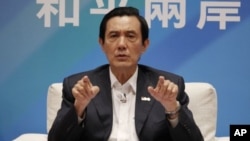Taiwan's minister for relations with mainland China has dismissed criticism of a possible peace treaty to formally end a civil war that China and the island fought more than 60 years ago.
Lai Shin-yuan, head of Taipei's Mainland Affairs Council, said Tuesday that a treaty would ensure lasting peace and reinforce the island's policy of no unification with China, no quest for the island's independence and no use of force. He said 90 percent of Taiwan's residents support that policy.
President Ma Ying-jeou said Monday he would like to sign a peace treaty with China within the next decade, if the Taiwanese people agree and if the treaty would meet the island's needs. He stipulated that any pact would have to be approved by the legislature.
The opposition Democratic Progressive Party criticized Mr. Ma's idea, calling it a step toward unification.
China considers Taiwan a renegade province, despite the island's self-rule since the end of the civil war in 1949. Chinese nationalists fled to the island that year and have since threatened repeatedly to declare independence. Beijing has countered with threats to use military force to prevent any such declaration.
President Ma has promoted economic cooperation with China since he took over in 2008. He is planning to run for re-election in mid-January. His chief rival is opposition leader Tsai Ing-wen.
Taiwan's top China negotiator said Tuesday that the island will sign an agreement with China later this week to cooperate on nuclear power-related security issues. Under the agreement, the two sides would inform each other of dangerous incidents at nuclear power plants.
Taiwan Official Defends Possible Peace Treaty With China




